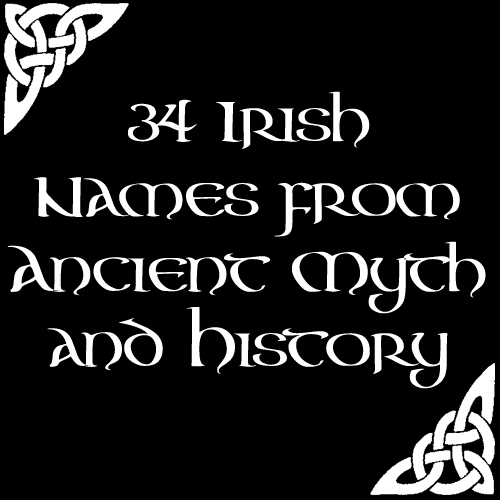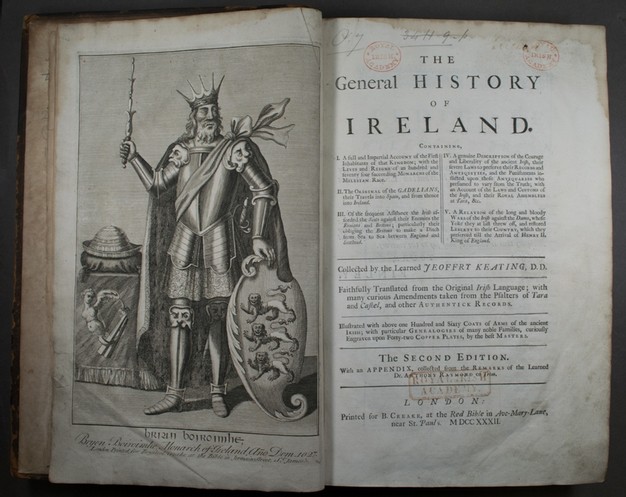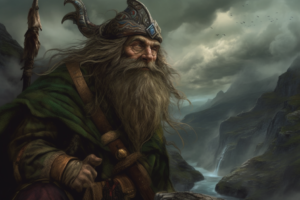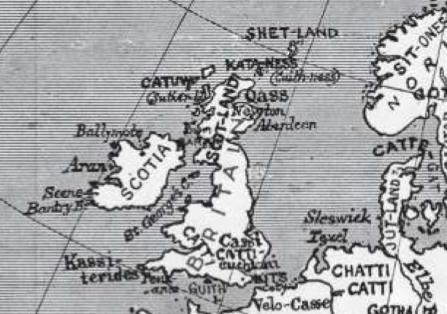ÁED m Ancient Irish, Irish Mythology
Older form of AODH.
ÁEDÁN m Ancient Irish, Irish Mythology
Older form of AODHÁN. This was the name of a 6th-century king of the Scots.
ÁEDH m Ancient Irish
Variant of ÁED.
BRADÁN m Ancient Irish
Derived from Irish Gaelic meaning “salmon”.
BRÉANAINN m Ancient Irish
Old Irish form of BRENDAN.
BRIAN m Irish, English, Ancient Irish
The meaning of this name is not known for certain but it is possibly related to the old Celtic element bre meaning “hill”, or by extension “high, noble”. It was borne by the semi-legendary Irish king Brian Boru, who thwarted Viking attempts to conquer Ireland in the 11th century. It came into use in England in the Middle Ages, introduced by Breton settlers. It subsequently became rare, but was revived in the 20th century.
CAISIDE m Ancient Irish
Old Irish byname meaning “curly haired”, from Irish Gaelic cas.
CAOMH m Ancient Irish
Masculine form of CAOIMHE.
CAOMHÁN m Ancient Irish
Diminutive of CAOMH. This was the name of a 6th-century Irish saint.
CATHASACH m Ancient Irish
Means “vigilant” in Irish.
CORRAIDHÍN m Ancient Irish
Means “little spear”, derived from Irish corradh “spear” and a
diminutive suffix.
CUIDIGHTHEACH m Ancient Irish
Old Irish by-name meaning “helpful”.
DONNDUBHÁN m Ancient Irish
Composed of the Gaelic element donn “brown” combined with dubh “dark” and a diminutive suffix.
DUBHSHLÁINE m Ancient Irish
Old Irish name derived from dubh “dark, black” and either slán “defiance” or Sláine, the Gaelic name of the River Slaney.
DUBHTHACH m Ancient Irish
Old Irish name derived from dubh “dark, black” in combination with a second element of unknown meaning.
EÓGAN m Ancient Irish, Irish Mythology
Older Irish form of EOGHAN.
FÁELÁN m Ancient Irish
Older form of FAOLÁN.
FEDELMID m & f Ancient Irish, Irish Mythology
Variant of FEIDLIMID.
FEDLIMID m & f Ancient Irish, Irish Mythology
Variant of FEIDLIMID.
FEIDLIMID m & f Ancient Irish, Irish Mythology
Possibly means “beauty” or “ever good” in Irish Gaelic. This was the name of three early kings of Munster.
GALCHOBHAR m Ancient Irish
Means “foreign help” in Irish.
LÓEGAIRE m Irish Mythology, Ancient Irish
Means “calf herder”, derived from Irish loagh “calf”. In Irish mythology Lóegaire Búadach was an Ulster warrior. He saved the life of the poet Áed, but died in the process. This was also the name of several Irish high kings.
LUIGSECH f Ancient Irish
Derived from the name of the Irish god LUGH.
MÁEDÓC m Ancient Irish
Meaning unknown. Saint Máedóc (also known as Áedán) of Ferns was a 7th-century Irish bishop.
MAELEACHLAINN m Ancient Irish
Variant of MÁEL SECHLAINN.
MÁEL MÁEDÓC m Ancient Irish
Means “disciple of Saint MÁEDÓC” in Irish. Saint Máel Máedóc (also known as Malachy) was a 12th-century archbishop of Armagh.
MÁEL SECHLAINN m Ancient Irish
Variant of MÁEL SECHNAILL.
MÁEL SECHNAILL m Ancient Irish
Means “disciple of Saint SEACHNALL” in Irish. This was the name of two Irish high kings: Máel Sechnaill mac Máele Ruanaid who ruled all of Ireland in the 9th century; and Máel Sechnaill mac Domnaill (called Malachy) who defeated the Norse of Dublin in the 10th century.
MATHGHAMHAIN m Ancient Irish
Means “bear” in Irish Gaelic. This was the name of a brother of the Irish king Brian Boru.
MOCHÁN m Ancient Irish
Derived from Irish moch “early” combined with a diminutive suffix.
NUALLÁN m Ancient Irish
Derived from Irish nuall “noble, famous” combined with a diminutive suffix.
ÓENGUS m Ancient Irish, Irish Mythology
Old Irish form of AONGHUS.
SLUAGHADHÁN m Ancient Irish
Derived from Irish sluaghadh “raid” and a diminutive suffix.
SUIBHNE m Irish, Scottish, Ancient Irish
Means “well-going” in Gaelic. This was the name of a 7th-century high king of Ireland.
This list was sourced from : http://www.behindthename.com/



